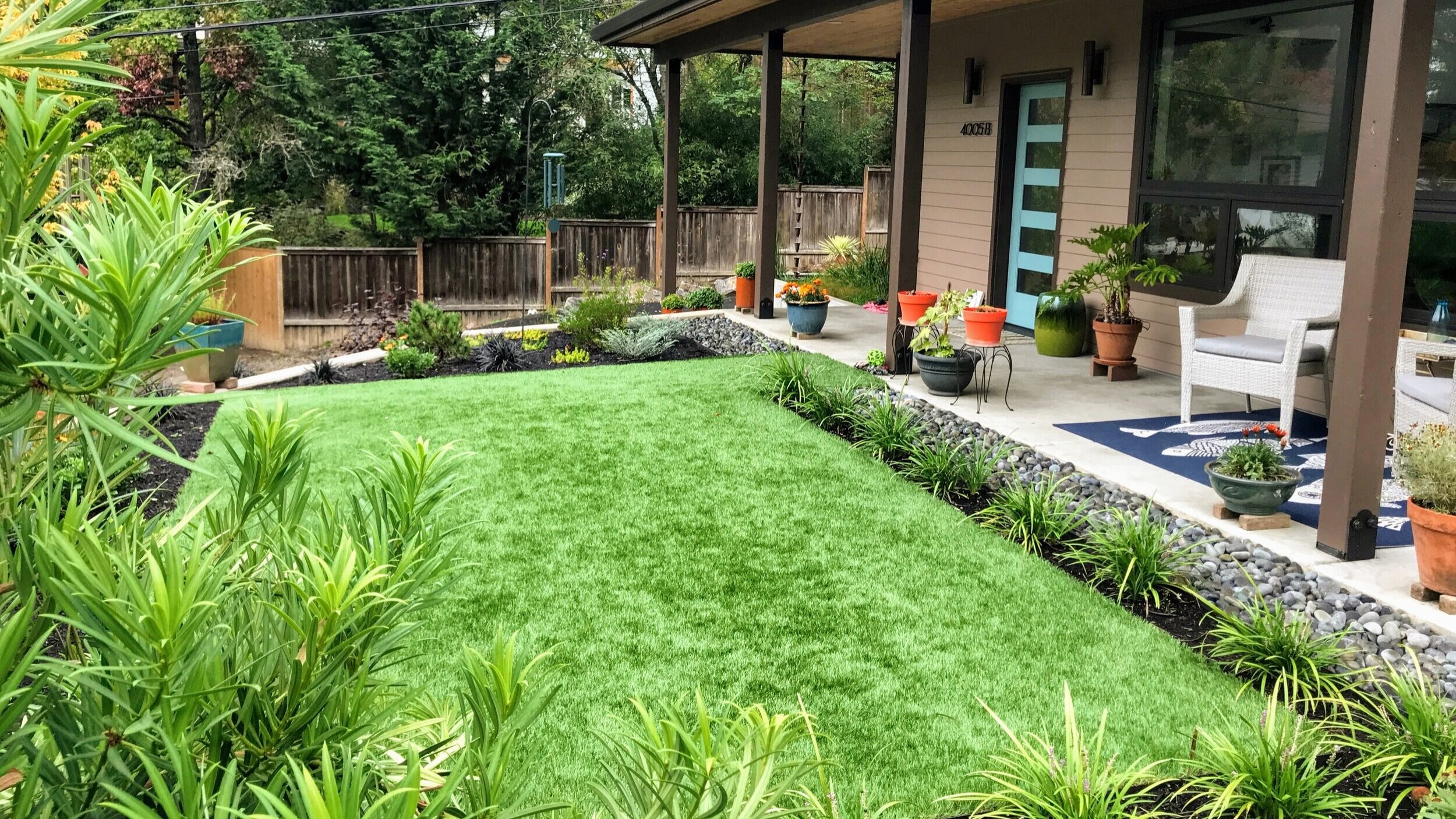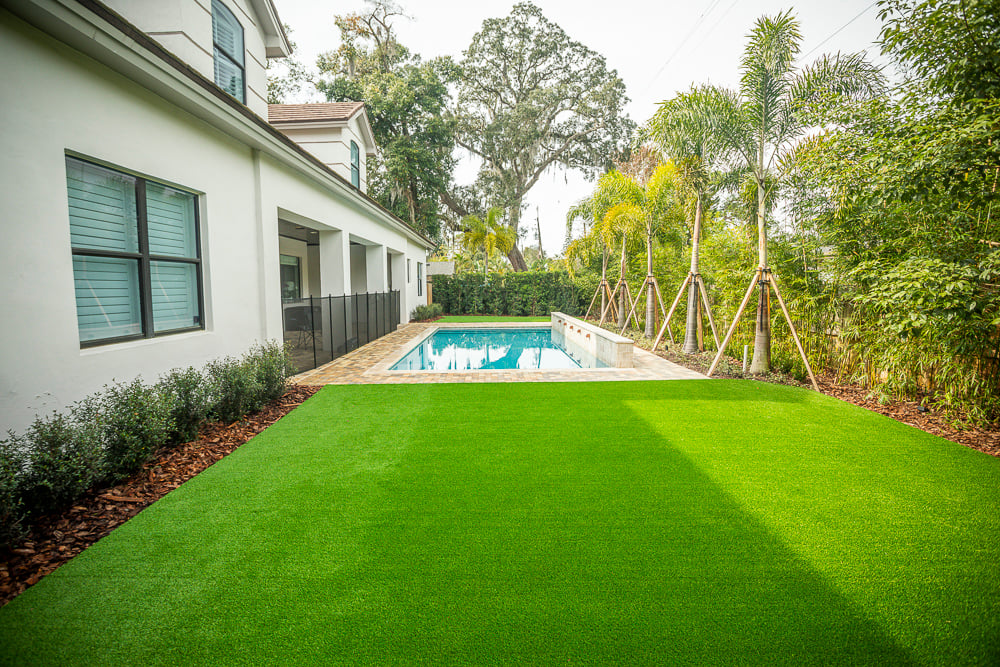Explore the Environmental Conveniences of Opting for Synthetic Grass Solutions
The fostering of fabricated turf solutions presents a compelling possibility to attend to pressing environmental obstacles. By considerably lowering water usage and reducing the application of dangerous chemicals, these alternatives not only advertise lasting landscaping however likewise shield neighborhood ecosystems.
Water Preservation Perks
Among one of the most substantial advantages of man-made grass is its capacity to save water. Conventional yard yards need considerable watering, especially in locations susceptible to dry spell or water limitations. On the other hand, synthetic grass does not require watering, considerably minimizing the overall need for water resources. This function is specifically advantageous in dry areas where water deficiency is a pressing concern.
By eliminating the need for normal watering, artificial turf adds to sustainable landscape techniques and helps mitigate the environmental effect of excessive water intake. The conservation of water prolongs to the decrease of runoff, which can lead to soil disintegration and river contamination.
In addition, the installment of synthetic grass enables home owners and districts to allot water sources extra effectively, concentrating on important uses such as alcohol consumption water and agriculture. The shift towards synthetic grass not only promotes accountable water usage but additionally aligns with wider ecological goals focused on maintaining natural deposits.
As neighborhoods increasingly focus on sustainability, the water preservation benefits of synthetic grass provide a compelling case for its adoption in domestic and commercial landscaping tasks.
Decreased Chemical Usage
The change to fabricated grass considerably lowers the dependence on chemical treatments typically made use of in natural grass upkeep. Conventional turf management commonly entails the application of herbicides, fertilizers, and pesticides to advertise development and control pests. These chemicals can posture risks to human health and wellness, regional wild animals, and the atmosphere, adding to dirt and water contamination.
In comparison, artificial grass eliminates the requirement for these harmful compounds. By lessening the release of synthetic substances right into the community, artificial turf promotes much healthier soil and water systems.
In addition, the lack of chemical drainage connected with synthetic grass setups aids shield local rivers from pollution, sustaining marine life and maintaining biodiversity. Turf installation phoenix az. As areas progressively prioritize sustainable techniques, choosing for artificial turf presents a practical solution that lines up with ecological preservation objectives. Through this change, homeowner can enjoy rich green areas without endangering ecological health and wellness, leading the way for a much more lasting future
Lower Carbon Footprint

Moreover, the installation of synthetic grass can result in considerable water conservation. Natural lawns need significant quantities of water for irrigation, which not just contributes to the carbon impact connected with water extraction and therapy but also pressures neighborhood water resources. In contrast, fabricated grass needs marginal upkeep, requiring no watering, therefore substantially lowering water usage and its associated power prices.
In addition, the long life of synthetic lawn adds to its decreased carbon effect. With a life-span of up to 15 years or even more, the requirement for constant substitutes is lessened, resulting in less waste and lower power intake in production and getting rid of typical turf choices. Overall, synthetic grass offers a sustainable option for eco click here for more mindful landscaping.
Habitat Conservation
Habitat preservation is an important factor to consider in the dispute over landscaping options, especially when contrasting synthetic grass to natural yard. Natural turf lawns typically call for extensive maintenance, including using herbicides, chemicals, and plant foods, which can detrimentally impact neighborhood ecosystems. These chemicals can leach into the dirt and waterways, damaging indigenous vegetation and animals and disrupting neighborhood habitats.
Man-made grass gets rid of the demand for hazardous chemicals, consequently shielding close-by wildlife and keeping the stability of surrounding ecosystems. The installment of fabricated grass can lead to the conversion of previous grass areas into even more biodiverse landscapes, such as pollinator gardens or indigenous plant locations, which can sustain regional wild animals.
Eventually, the shift to fabricated lawn not just saves water and minimizes maintenance efforts but likewise cultivates an extra harmonious partnership in between human tasks and the native environment, advertising environment conservation at the same time.
Long-Term Sustainability
Long-term sustainability is a crucial factor in examining the benefits of artificial lawn over typical yard yards. Among the most significant benefits of synthetic grass is its durability; it can last up to 15-20 years with marginal upkeep, whereas all-natural yard requires frequent reseeding and replacement. This longevity Visit This Link lowers the requirement for constant sources, such as water, plant foods, and chemicals, which are vital for preserving a healthy yard lawn.
In addition, synthetic grass adds to a reduction in carbon emissions related to lawn care tools. Standard lawns typically call for gas-powered lawn mowers, trimmers, and blowers, all of which add to air contamination. Arizona turf. On the other hand, synthetic grass eliminates the requirement for such equipment, advertising a cleaner atmosphere
Moreover, the manufacturing of artificial lawn increasingly uses recycled materials, improving its sustainability account. As makers adopt green practices, the ecological impact of synthetic grass remains to diminish.

Verdict
The adoption of fabricated grass services offers substantial ecological advantages, consisting of substantial water preservation, minimized dependence on damaging chemicals, and a reduced carbon footprint. Fabricated turf help in preserving natural environments by minimizing land disturbance and promoting long-term sustainability through the use of long lasting materials. Jointly, these factors emphasize the possibility of synthetic grass to contribute favorably to environmental health and provide a feasible alternative to standard landscape design practices in a progressively resource-conscious world.
In contrast, man-made grass does not require watering, significantly minimizing the general need for water resources. By minimizing the launch of artificial compounds right into the community, artificial lawn advertises much healthier soil and water systems.
Furthermore, the setup of artificial lawn can result in considerable water preservation. In contrast, fabricated lawn requires marginal upkeep, needing no watering, thus significantly decreasing water use and its linked power prices.
